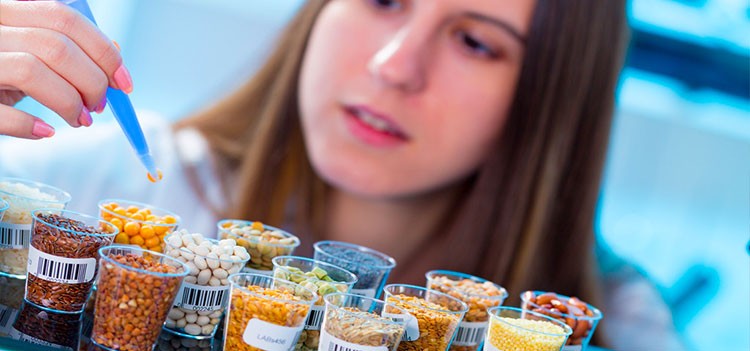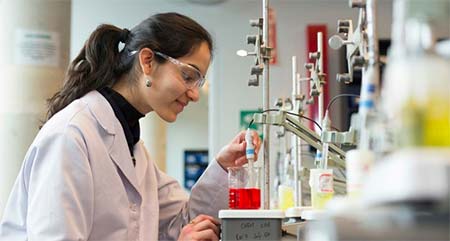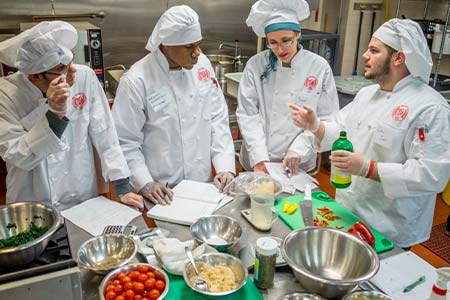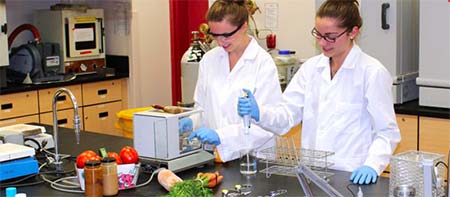Few lines about Food & Nutrition
The Food & Nutrition are interrelated and multi-disciplinary subjects that apparently deal with the study of food science and nutritional science. Lets understand in detail
Food Science
Food Science is a multidisciplinary field involving chemistry, biochemistry, nutrition microbiology and engineering to give the students the scientific knowledge to solve real problems associated with the many facets of the food system. The basis of the discipline lies in an outstanding chemistry of food components such as proteins, carbohydrates, fats and water and the reactions they undergo during processing and storage.
Nutrition
Nutrition is the study of how food and drink affect our bodies with a special regard to the essential nutrients necessary to support human health. It looks at the physiological and biochemical processes involved in nourishment and how substances in food provide energy or converted into body tissues. These nutrients which are the source of energy for our bodies are classified as carbohydrates, proteins, fats, fibre, minerals, vitamins and water. Study of all these aspects and their effects on the human body is known as nutrition.
Few lines about M.Sc Food and Nutrition
M.Sc Food and Nutrition is a 2-years post-graduate programme that is divided into 4-semesters. The course aims to offer the students the opportunity to acquire requisite skills for functioning in various technical roles in the food industry, health sector and food regulatory agencies. The course trains the students to investigate the scientific aspects of food nutrition and the wider implications of diet on our health and wellbeing. The course strikes the fine balance between the scientific study of food nutrition and related health aspects.
The course offers a comprehensive multidisciplinary study of the nature and quality of food supply and the nutritional requirements for health in people. It includes course work in areas of nutrition, food management and food science, basic chemistry, biochemistry, biology, physiology and behavioural management.
Specialisations available in M.Sc Food & Nutrition
The important specialisations available for M.Sc Food and Nutrition are:
- M.Sc Food Science & Nutrition
- M.Sc Food Science and Technology
- M.Sc Clinical Nutrition and Dietetics
- M.Voc Food Processing and Nutraceuticals
Eligibility for M.Sc Food & Nutrition
- The students who have passed PUC or 10+2 with PCB or CBZ from recognised board
- The students with bachelor’s degree in food and nutrition/food technology/food science and quality control/clinical nutrition/nutrition and dietetics of composite/general home science/biochemistry/biotechnology/chemistry/microbiology/agriculture/dairy or fisheries or any other allied science subjects under MBBS, or B.Pharma with 50% aggregate from recognised university
Admission to M.Sc Food and Nutrition
The eligible students can take admission to M.Sc Food and Nutrition course by two modes. The first one is merit based and the second in direct admission.
1. Merit Based Admission
There are many reputed colleges and universities that conduct institution-based entrance exams for the admission to M.Sc Food and Nutrition course, such mode of admission is called merit-based entrance exam. Every college has a limited number of merit seats, and the entrance exams are conducted to these seats. The main reason to conduct the entrance exam is to select the hardworking and serious students from the group of non-serious ones. The qualified students are then allotted merit seats, and the fees are nominal for these merit seats.
2. Direct Admission
The students can also take admission to M.Sc Food and Science course by another mode such mode is called direct admission. The students under direct admission can take admission to their desired colleges under management quota without any entrance exams. The students under direct admission are given special privileges where they are not required to appear for any institution-based entrance exams for admissions. Another benefit is that the students can choose their desired colleges and book their seats even before the starting of the academic year. The students interested in this mode of admission are required to contact educational counselling centres to get more details about direct admission.
Course Curriculum
The students of M.Sc Food and Nutrition will study the following subjects in their course duration
| Sl. No. | Subjects of Study |
|---|---|
| 1 | Statistical Methods in Food Science & Nutrition |
| 2 | Research methods in Food Science & Nutrition |
| 3 | Nutrition Epidemiology, Paediatric and Geriatric Nutrition |
| 4 | Advanced Food Science |
| 5 | Biochemistry |
| 6 | Biomolecules and Energetics |
| 7 | Human Physiology |
| 8 | Problems in Human Nutrition |
| 9 | Scientific Writing & Nutrition Communication |
| 10 | Food Microbiology |
| 11 | Metabolism and Diagnostic Biochemistry |
| 12 | Techniques and Instrumentation in Nutrition Research |
| 13 | Food Processing Nutrition in Diseases and Disorders |
| 14 | Food Processing and Technology |
| 15 | Institutional Food Administration and Country & Continental Cuisines |
| 16 | Food Product- Development Safety and Quality Control |
| 17 | Advanced Nutrition |
| 18 | Nutrition for Health & Fitness |
| 19 | Applied and Community Nutrition |
| 20 | Therapeutic Nutrition |
| 21 | Clinical Nutrition and Dietetics |
| 22 | Nutrition and Critical Care |
Career Prospects for M.Sc Food and Nutrition
There are ample job opportunities for M.Sc Food and Nutrition students. They can join in hotels. Restaurants, cruise liners, catering services etc. The students who are interested in research can join Ph.D programmes to take up research in the field of food and nutrition. If they are interested in detailed study of the field then they can join M.Phil programmes.
The students can also join as lecturers in different colleges to take up teaching of food and nutrition subjects.
Job Roles
Some of the job roles available for M.Sc Food and Nutrition are
- Food Scientist
- Food Technologist
- Quality Control Managers
- Food Production Manager
Salary and Emoluments
The fresh M.Sc Food and Nutrition students will be earning around 5 lakhs to 8 lakhs per annum. The senior professionals will be earning around 6 lakhs to 8 lakhs per annum. The salary depends upon location and recruiter.
Top Recruiters hiring M.Sc Food & Nutrition
The top organisations hiring M.Sc Food and Nutrition are:
- ITC Group of Hotels
- Nestle
- Minute Maid
- Britannia
- Cadbury
- Taj Group of Hotels
- Oberoi Group
Final Lines
The hospitality industry is the fastest growing industry in the world. The restaurants and cruise liners are the most profit-making industries in the world. The M.Sc Food and Nutrition students are hired in large numbers especially in hotels and restaurants. The M.Sc Food and Nutrition students are responsible to quality check the food items that go into the table. They are also responsible to procure high quality raw materials in cost effective means. The demand for skilled professionals is increasing day by day. The industry pays well for the skilled professionals and also offers better opportunities in career growth.
The students who are interested in food and nutrition can join the M.Sc Food and Nutrition course and expect a decent salary with good excellent growth opportunities in the career.




